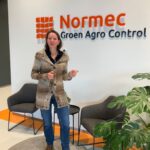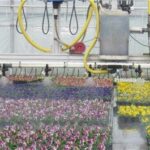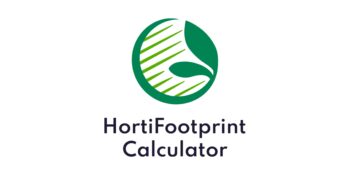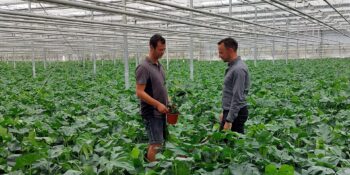All MPS-ABC growers have to face it: residue analysis sampling. Residue analysis has always been a key component of the MPS-ABC certification standard and have become a fact of life for its participants. But who is responsible for all the sampling and how does the process work? For the past decade, Normec Groen Agro Control has been performing analyses for MPS. High time for a closer look!

Ines van Marrewijk, Senior Product Manager Horticulture at Normec Groen Agro Control
Normec Groen Agro Control was founded almost 30 years ago by two guys working in the basement of a TU Delft building and has since grown into a thriving enterprise with advanced labs and research facilities in the Netherlands and Peru. They work with partners all over the world in order to publish their analyses and provide services to as wide an audience as possible. Originally founded as a lab focusing on plant growth and food safety analyses, it later expanded to residues for the flowers and ornamentals sector. ‘It wasn’t long before we set up specialised laboratories and now we have labs for microbiological, inorganic and organic analyses. We are ISO-accredited both for sampling and for a wide range of analyses,’ says Ines van Marrewijk, Senior Product Manager Horticulture at Normec Groen Agro Control.
For MPS, Normec Groen Agro Control analyses samples for MPS-ABC and independently collects samples from growers in the Netherlands, while auditors abroad usually collect samples from growers in their local area. Whereas Normec Groen Agro Control takes care of the analysis, MPS is in charge of assessing the analysis results. ‘MPS owns the data and we don’t use it for anything else. MPS is also the first point of contact, so when an MPS customer rings me with questions about a report, I will usually refer them to MPS,’ Van Marrewijk continues. MPS compares the results with their MPS-ABC records and asks growers to justify any discrepancies. Occasionally, MPS will circle back to Van Marrewijk and ask her to check whether a mistake might have been made. ‘When that happens, I ask the lab to review the data and repeat the analysis if necessary. We always store part of the original MPS sample in our freezer for several weeks, which is longer than usual because MPS-ABC qualifications are assessed every quarter rather than every month.’ If the results of the second analysis match those of the first, the grower will have no choice but to accept them. Van Marrewijk: ‘If the second analysis produces different findings, we’ll acknowledge that a mistake was made and report the real results.’ In some cases, the labs are testing for substances that happen to be very similar to intrinsic substances found in certain crops, so Normec Groen Agro Control can find itself correcting previous reports every now and again. ‘In fact, it’s a fixed part of our improvement procedure. Naturally, we prefer to get things right the first time around, but it’s always important to stay on the lookout for mistakes and take precautions to prevent mistakes in the future.’
 Growers have grown used to visits from sample collectors by now, but in the early days, many were caught by surprise. ‘We arrive unannounced, as required under the certification standard, but we always bring a document or letter signed by MPS,’ Van Marrewijk explains. Growers have now also realised that they too can benefit from the analysis report. In recent years, an agreement has been made that collectors should also take samples of deliverable products where possible. ‘This means the grower can also provide the report to buyers or traders, who are requesting it more frequently these days. While cuttings are usually the main deliverable for propagators, they are also getting more requests for residue analysis results.’
Growers have grown used to visits from sample collectors by now, but in the early days, many were caught by surprise. ‘We arrive unannounced, as required under the certification standard, but we always bring a document or letter signed by MPS,’ Van Marrewijk explains. Growers have now also realised that they too can benefit from the analysis report. In recent years, an agreement has been made that collectors should also take samples of deliverable products where possible. ‘This means the grower can also provide the report to buyers or traders, who are requesting it more frequently these days. While cuttings are usually the main deliverable for propagators, they are also getting more requests for residue analysis results.’
Growers need never worry about Normec Groen Agro Control taking samples without their permission. ‘If we arrive somewhere and find that no one is around, and we cannot get in touch with our contact, we don’t just barge in regardless,’ says Van Marrewijk. If a grower does give us permission over the phone to take a sample without anyone present, the sample collectors know what to do and won’t have to come back again. ‘It’s an approach that works for us and for growers. We are more than satisfied with the collaboration with MPS and hope to keep working together for a long time to come,’ Van Marrewijk concludes.



